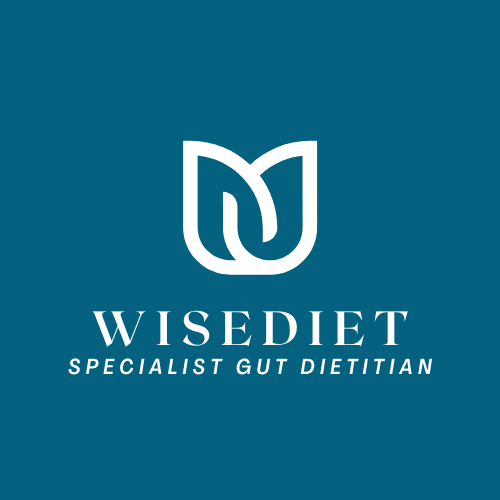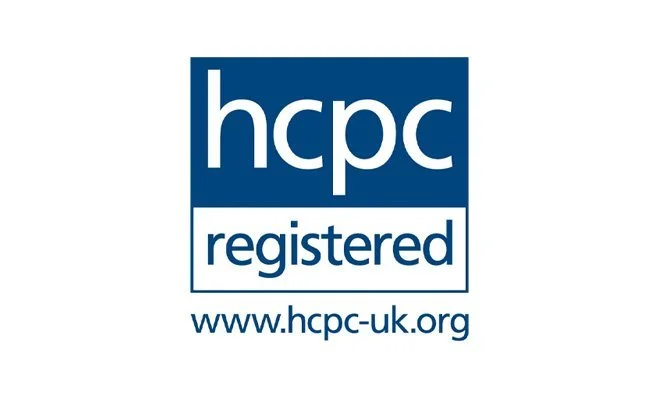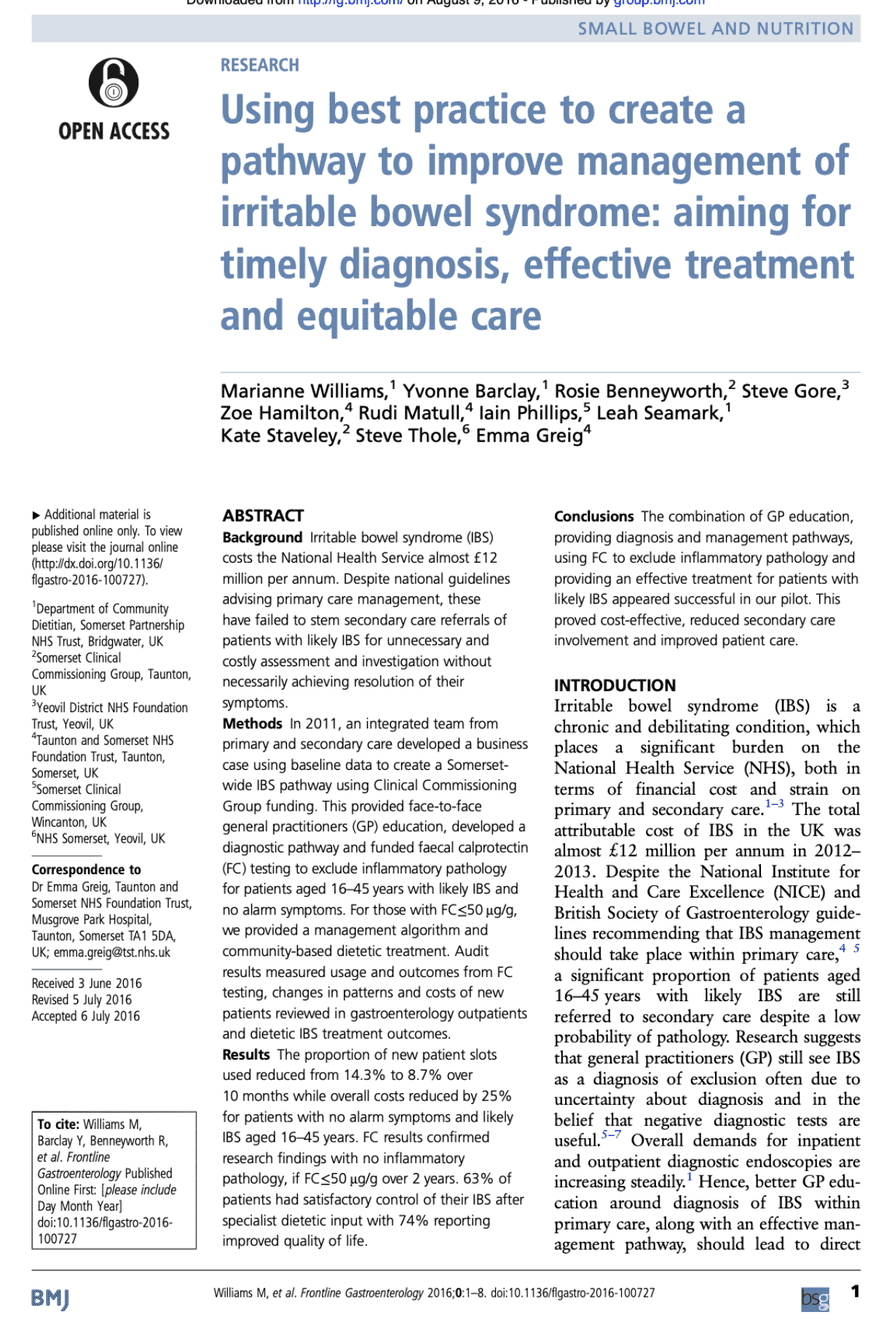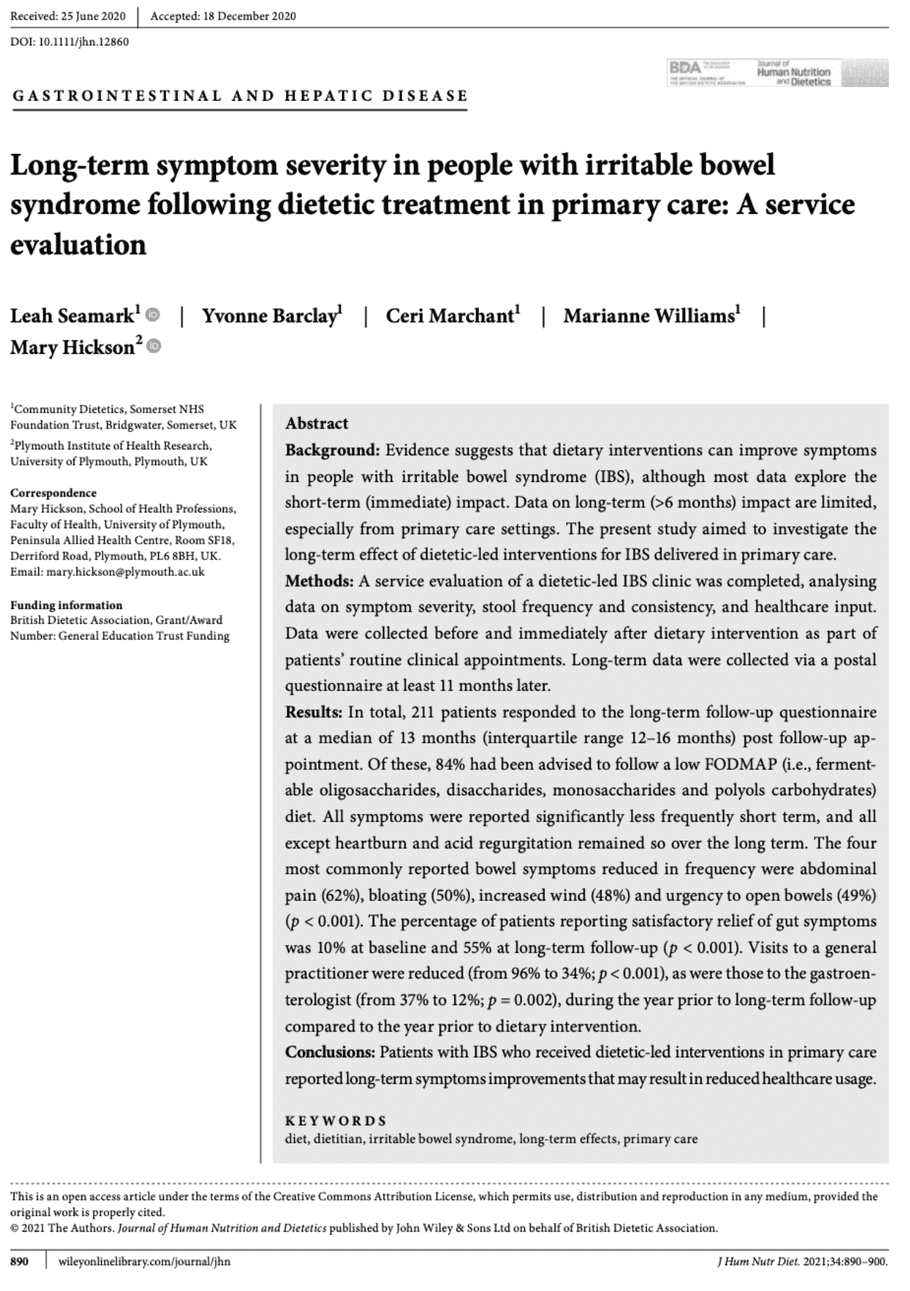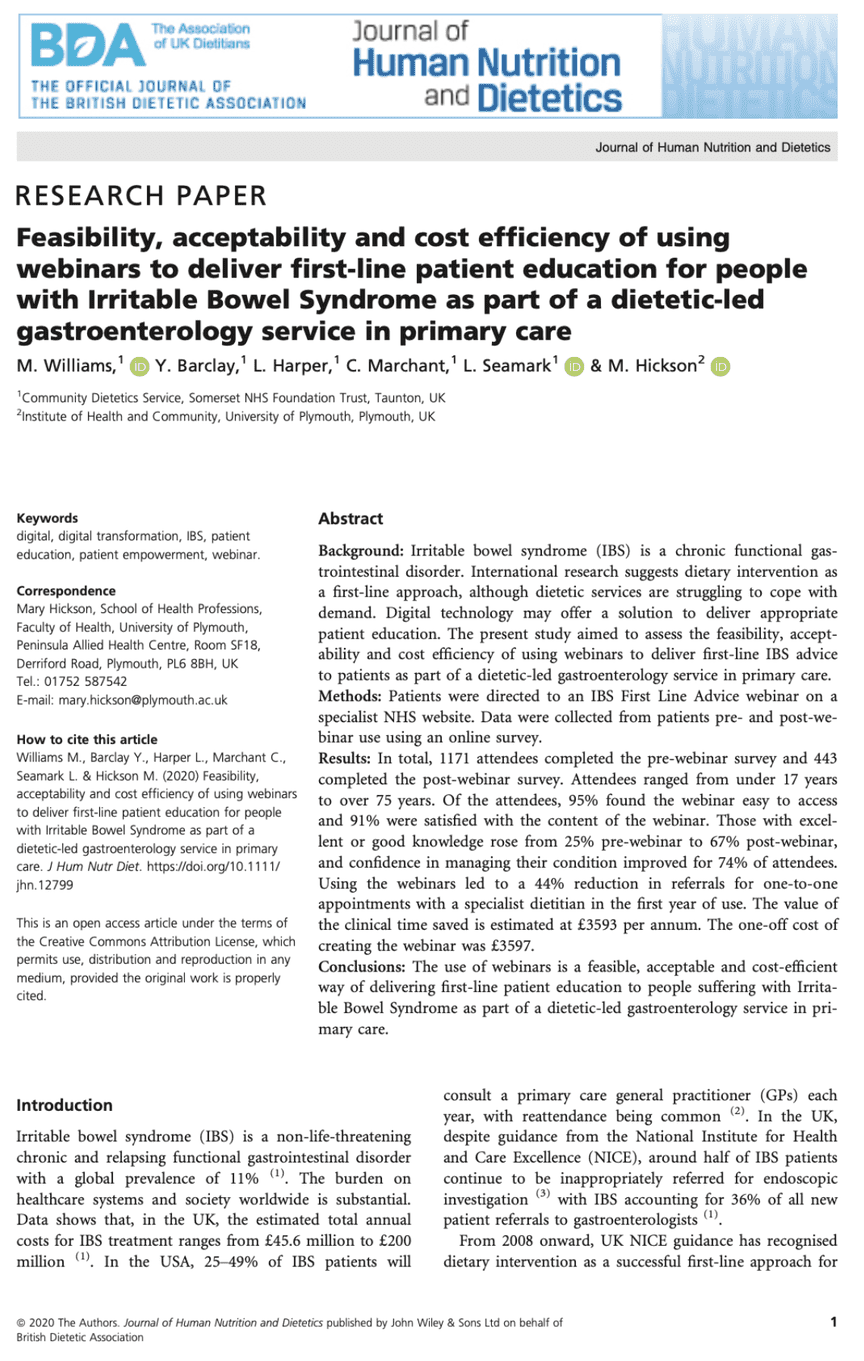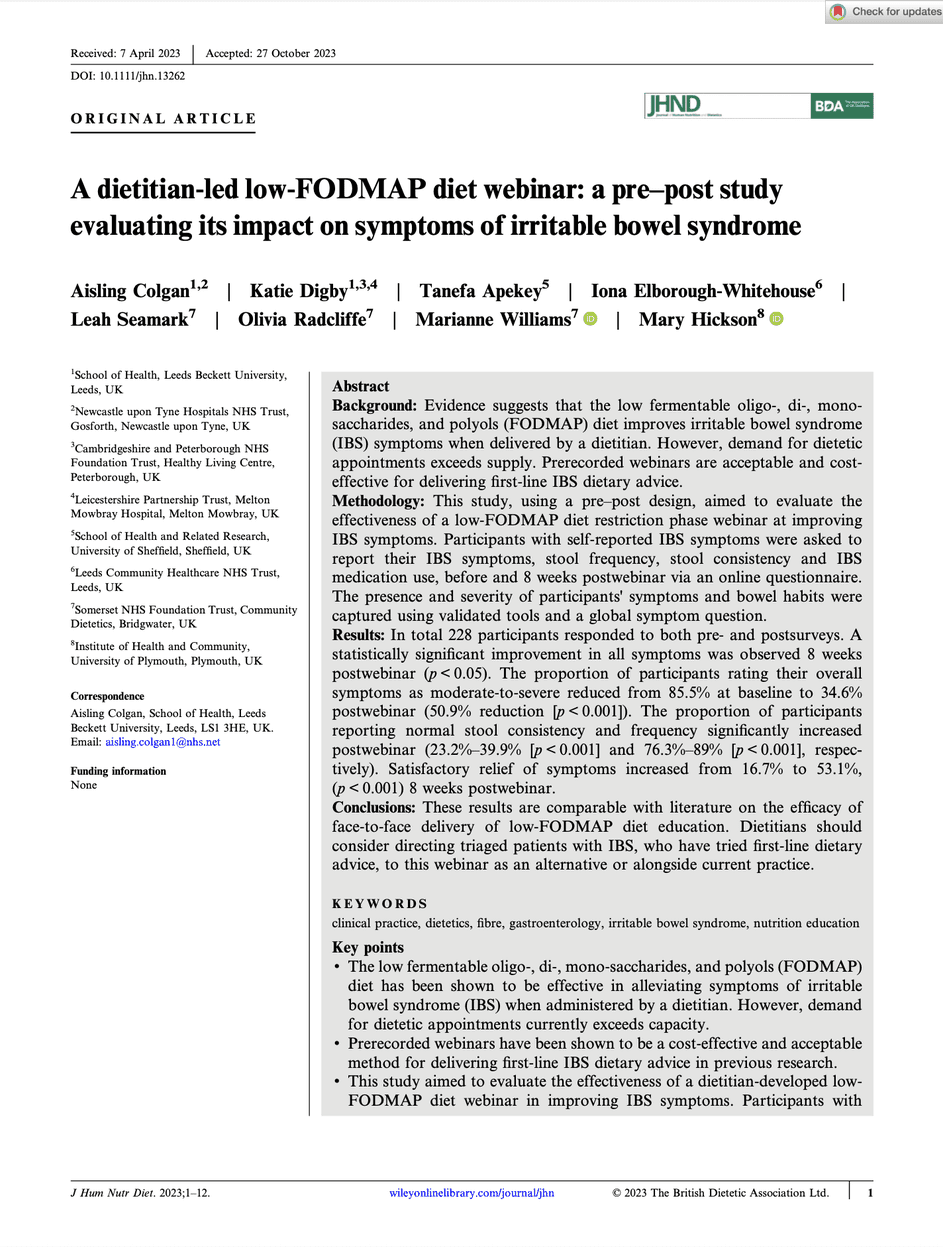“Free your life from gut symptoms.”
— Marianne Williams, Specialist Gut Dietitian
Awards
Awards
Marianne is a multi award-winning specialist gut dietitian. Her research has been published in medical journals and her ground breaking work with the NHS has been recognised throughout the UK.
One-to-One Digital Consultations
I run a specialist gut health clinic, supporting people from all over the UK. Whether you’re struggling with IBS, coeliac disease, gluten issues, diverticular disease, food allergies or other digestive problems, I’m here to help.
Every plan is tailored to you—because no two people are the same. My aim is to get to the bottom of what’s going on and help you feel better, so you can get back to enjoying life without your gut getting in the way…
Free Diet Education Videos
If one-to-one appointments aren’t right for you, these free video resources offer a flexible way to get expert support.
Created by award-winning dietitian Marianne Williams, these videos let you learn from home, in your own time—no need to travel, take time off work, or wait for an appointment.
They’re designed to give you clear, trustworthy advice to help manage your gut symptoms and feel more in control of your health.
“Information is power. Patients need reliable and comprehensive information that is personal to them and then they can feel empowered to improve their health…”
— Marianne Williams, BSc Hons, MSc Allergy, RD
What are the common causes of gut symptoms?
-
The Low FODMAP Diet has revolutionised the treatment of IBS and is now recognised world-wide as an important dietary intervention for this condition. However, this diet is restrictive and may not be necessary for all patients. Therefore it is important to seek advice from a specialist dietitian who can help you navigate the best approach for you.
Patients may find the video below useful for a first line approach to their IBS symptoms.
-
Diverticular Disease is often diagnosed following investigations for gut symptoms. Diverticular Disease sounds like a dramatic diagnosis but in fact most people will develop some diverticula as they age, with the majority having absolutely no symptoms throughout their lifetime.
Diverticula are small bulges or pockets which develop in the lining of the intestine. Diverticulosis is diagnosed when these pockets result in pain on the lower left side of the abdomen. Diverticulitis describes when the pockets become infected which is generally associated with a raised temperature. Only 5% of people with Diverticular Disease will suffer from diverticulitis so it is relatively uncommon.
The dietary advice has changed and patients with Diverticular Disease no longer need to avoid nuts, seeds, pips or fruit skins, and in fact, evidence now shows that patients are less likely to develop diverticular disease or suffer with diverticulitis if they keep plenty of fibre in their diet.
Often the gut symptoms that first led to the diagnosis of Diverticular Disease are in fact caused by IBS and many patients will benefit from an IBS dietary approach.
-
Wheat can cause of a number of conditions and each condition requires an entirely different dietary intervention so it is important to get the correct diagnosis
Coeliac Disease is an autoimmune condition affecting 1% of the population. The protein ‘gluten’ found in wheat, barley and rye will cause the immune system to attack the lining of the small intestine resulting in damage to the gut wall. Symptoms such as abdominal pain, urgent diarrhoea, wind and bloating are common, although patients may also suffer with non-gut symptoms such as joint pain, hair loss, infertility, extreme fatigue, headaches etc. A simple blood test at your GP surgery can diagnose this condition. In order to avoid longterm health complications treatment is a lifelong very strict gluten free diet.
Gluten Sensitivity is a relatively newly acknowledged condition which is still undergoing considerable research. Patients can suffer with symptoms similar to coeliac disease, but investigations do not show any damage to the lining of the gut. There are no tests for this condition and it is still not clear if the condition is caused by gluten or a different protein within wheat, barley or rye. It is also unclear if the diet needs to be lifelong or temporary, or how strict the diet needs to be. Dietary intervention is likely to differ between patients depending on their level of sensitivity.
Wheat Allergy is relatively uncommon in adults and can cause, or contribute to, a number of allergic conditions such as Exercise Induced Anaphylaxis; Bakers Asthma; Eosinophilic Oesophagitis. In adults, allergic reactions to wheat can also depend on ‘co-factors’ with symptoms more likely or more severe if wheat is consumed along with exercise, alcohol or non-steroidal anti-inflammatories.
Often people suffer with gut symptoms when they eat wheat and assume that they are suffering with ‘wheat allergy’ when in fact they are suffering with the IBS fermentation symptoms caused by wheat. Hence, it is vital to get the correct diagnosis as a wheat allergy diet requires extremely strict avoidance while the more common IBS-type reaction to wheat only requires a reduction in wheat intake.
-
Bile salts (also known as ‘bile acids’) are produced in the liver and released by the gallbladder to help with digestion and absorption of foods. Over 95% of the bile salts are re-absorbed by the liver to be used again.
However, if bile salts are not re-absorbed properly in your small intestine then they are likely to build up in your colon upsetting the chemical balance in your gut. These excess bile salts will cause the colon to release water into your stools resulting in watery diarrhoea. This condition is known as ‘Bile Salt Malabsorption’.
This condition can occur in some patients following the removal of their gall bladder. Patients require a SeHCAT scan to diagnose the condition and can be prescribed medication to reduce the symptoms. The effects of diet on this condition are still under investigation.
-
Food allergy affecting the gut is relatively rare in adults. However, it does occur, and the most common ‘red flags’ that I look out for in my patients are extreme symptoms such as multiple daily explosive stools (up to 10-15 per day) with regular accidents.
Importantly, food allergy that predominantly affects the gut and does not cause breathing or skin reactions, is likely to be caused by a non-IgE allergy for which there are no allergy tests. Hence, the normal allergy tests (skin prick tests or specific IgE tests) are of no use in the diagnosis of gut-related food allergy.
Single or multiple food elimination diets may be used to uncover the food or foods involved.
However, before a food allergy diagnosis can be made, it is vital that these patients undergo investigations with a gastroenterology team to rule out other conditions such as inflammatory bowel disease.
Other adult food allergies:
Pollen Food Syndrome is the most common form of adult food allergy. Patients with this condition are likely to suffer with reactions to many foods particularly fruits and vegetables. Although symptoms can be alarming, they generally only affect the mouth and throat and pass without the need for medication. Patients with this condition will generally find that reactions only occur to the raw forms of the food e.g. raw carrots, and that they can eat all the relevant foods if the foods are well-cooked.
Eosinophilic Oesophagitis (EO) is a condition affecting the oesophagus (gullet) where certain foods can cause the lining of the oesophagus to over-produce immune cells known as ‘oeosinophils’. The build up of these oeosinophils can cause damage to the lining of the gullet resulting in problems with swallowing food. In some cases patients can experience distressing ‘food impaction’ where food can become stuck in the gullet. Treatment for EO generally revolves around medication and the elimination of culprit foods. Dietetic support is essential to avoid nutritional deficiencies.
-
Histamine is one of a group of chemicals know as vasoactive amines which occur naturally in foods. Sensitivity to vasoactive amines is classified as a ‘pharmacological food hypersensitivity’ rather than a food allergy. Symptoms may be mistaken for a food allergy because symptoms can appear quite similar.
Symptoms can include flushing, itching, swelling, urticaria (hives/nettle rash), runny or blocked nose, asthma, irregular heartbeat, hypotension (drop in blood pressure), headache, abdominal pain, nausea, diarrhoea, and bloating. However, many of the gut symptoms are the same as those experienced in other gut conditions e.g. IBS , so it is vital to get a correct diagnosis before embarking on a highly restrictive low histamine diet.
NOTE: Histamine consumed in high levels can affect anyone e.g. oily fish that is degrading can contain very high levels of histamine and when eaten can cause a condition known as ‘scombroid poisoning’. Oily ‘brown’ fish such as tuna and mackerel are often the culprit as they already contain naturally high levels of histamine, although any fish that is not fresh can be involved. However this is a form of fish poisoning and is not a fish allergy, therefore there is no need to avoid fish in the longterm - simply make sure that fish is fresh when eaten.
-
Research is now showing that COVID-19 is associated with an increased risk of long-term gastrointestinal symptoms, including post infectious IBS. This was particularly observed in patients who suffered with notable shortness of breath during their COVID infection and those that had a previous history of allergies or a history of long-term use of reflux medications known as ‘proton pump inhibitors’.
It is still too early to know whether or not patients suffering with post COVID IBS will respond to standard IBS dietary treatment. However, treatments such as the Low FODMAP Diet are likely to form the basis of treatment in the short-term until research can confirm the most effective approaches for this group of patients.
-
The Low FODMAP Diet has been shown to reduce symptoms in people with inflammatory bowel disease (IBD) who have overlapping IBS. However, the Low FODMAP diet will not cure or change the underlying diagnosis of IBD and will not alter inflammation within the gut. If your IBD is in remission but you are still experiencing gut symptoms then the Low FODMAP Diet or an adapted version this diet may be useful. Remember, however, that the priority in IBD is to maintain weight and avoid weight loss or malnutrition, and hence dietetic advice and support is essential before embarking on any dietary changes.
-
A group of inherited disorders that affects the skin and the joints. Often patients are hypermobile and may be able to move their bodies into unusual positions that are not possible for the general population. Many of these patients also suffer with gut symptoms and allergic conditions although research has not yet explained why. Patients commonly report that they have found some relief from gut symptoms with the use of the low FODMAP diet, particularly bloating, abdominal pain and diarrhoea. And some research suggests that the Low FODMAP diet may reduce histamine levels within the body although it remains unclear if this reduction in histamine has a direct effect on gut symptoms.
Examples of Publications & Research Involving Marianne Williams
